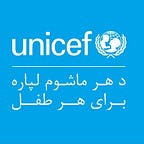The right to play
Creating safe spaces for children in emergencies in Afghanistan
© UNICEF Afghanistan/2017/Sharukhi
With reporting by Lameha Sherzad
ETTIFAQ VILLAGE, Nangarhar Province, Afghanistan, 1 February 2018 — There are more than a thousand families in Ettifaq village in Afghanistan’s Nangarhar Province, near the border with Pakistan. Many are returnees from Pakistan or internally displaced persons impacted by violence and conflict in neighbouring provinces.
A recent influx of new families following armed conflict in the nearby Khogyani district has not been easy for Ettifaq, which has already been feeling the burden of refugee families for two years. Though physically safe from the conflict, Ettifaq has struggles of its own. Schools and health facilities are far away and poorly equipped; access to clean water is limited. Children struggle to find a place to play and gather.
© UNICEF Afghanistan/2017/Sharukhi
UNICEF Afghanistan works with Afghan NGO Tabish to facilitate a safe, supportive environment for children like those in Ettifaq, whose daily lives have been disrupted by conflict, displacement or migration. Trained to follow UNICEF guidelines on psychological, emotional and physical health during emergencies, Tabish staff provide psychosocial support to Afghan children and women entangled in crises.
Child-friendly spaces offer a secure setting where children can be children , where they can run, sing and play together. These sanctuaries also offer essential health services like vaccinations and malnutrition screenings, and help to protect children from exploitation and trafficking.
Opening doors for girls
Zainab, 10, and her six siblings left Wazir village in Khogyani District a few months ago when it was engulfed by fighting by anti-government elements. Their home and belongings have since been bombed.
The child-friendly space in their neighbourhood has provided Zainab and her sister Madina, who is 8, their first chance to go to school.
“I always wished to study and play with other girls but never had an opportunity to go to a place where I could do that.” — Zainab, 10, dreams of becoming a teacher.
“Our house is very far from a girls’ school, and my husband does not allow the girls to travel so far because of the general insecurity here,” Zainab’s mother, Najiba, explains. “No girls from our neighbourhood go to school.”
Girls older than eight or nine year old are not allowed to play outdoors in Ettifaq village so Zainab is happier since joining the child-friendly space. The displacement had made her less social, but she now interacts with children and has a safe place to socialize. She has also learned new things about good hygiene and is taking better care of herself and her younger sisters.
“The centre is a big opportunity for our daughters to get together and interact with other children. We feel our daughters are safe there and hope one day they will find a chance to go to a formal school as well,” Najiba says.
Solving problems, sharing dreams
Meraaj is 13 years old and in Grade 8. Six months ago, his family left their home in Kunar Province after his father was killed by ongoing violence. An uncle helped Meraaj’s family resettle in Ettifaq and shares his home with them. The whole family — three sisters, two brothers and their mother — share one room.
Meraaj rises early every morning to help his uncle, a house painter, until 9 a.m. In return, his uncle pays a small amount to help the family meet their basic needs. A month ago, he started going to the child-friendly space after finishing work.
“I used to feel sad and lonely because I lost my best friends and schoolmates when we had to leave our home. I wished for someone to talk to.
“Since I started coming here, I made three best friends. We play football and enjoy our time together. Whenever I feel unhappy, I share my problems with them and then I feel lighter.” — Meeraj, 13
Rahimullah, 14, is one of Meerah’s new friends: “When Meraaj joined the class, he wouldn’t talk to us,” Rahimullah says. “He was very sensitive and cried over small things. He eventually talked about his father’s death and how upset he is about his family’s poor economic situation.”
He adds, “Before this place, we couldn’t even afford a football. We didn’t have access to a person like our teacher who guides us to be good friends to each other.”
A place for everyone
Saima is a 12-year-old returnee from Pakistan. Her family of nine lost their father a few years ago, leaving her mother widowed and her eldest brother Basit, 17, to lead the family. Basit works at a brick-making factory after school to support his family.
Alongside her family’s struggles, Saima lives with a cognitive impairment that makes her day-day-day life even harder.
“It was not safe to let her go places by herself,” says Raj Bibi, Saima’s mother. “She used to sit at home, getting bored, crying for me to allow her to go outside. Now we have a safe place in the village for our daughters to play and learn.”
“I love playing with other children and all the toys here. I like my teacher a lot, too.” — Saima, 12
Since joining the child-friendly space, Saima’s mother notes positive changes in her daughter’s behaviour. “She is less aggressive than she used to be and tries to listen to my words. She is much happier.”
Psychosocial support is being provided through child-friendly spaces in emergencies in Afghanistan with generous support from UK aid from the UK government, and the government of Japan.
